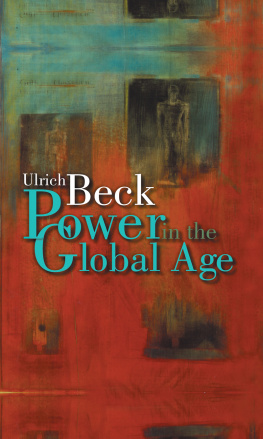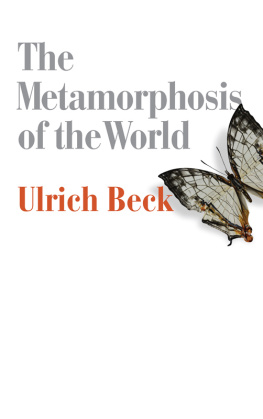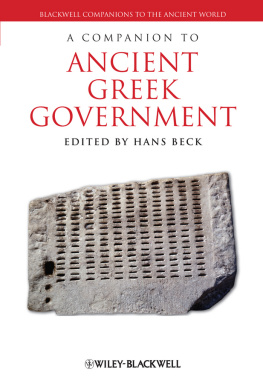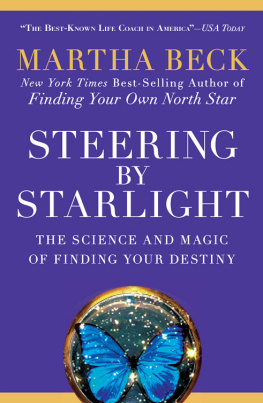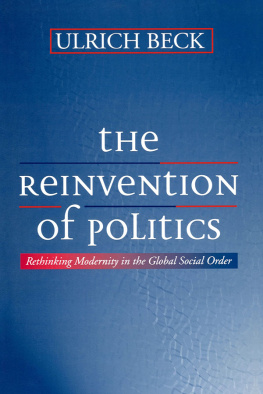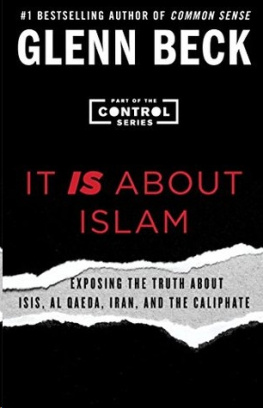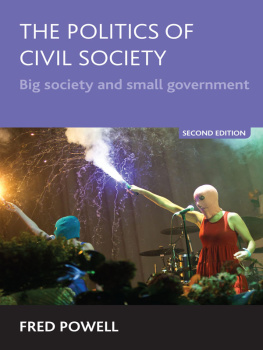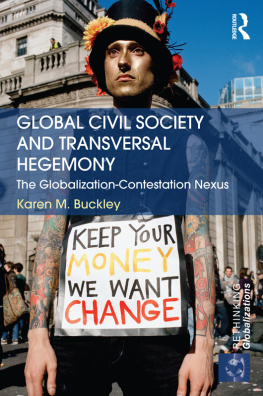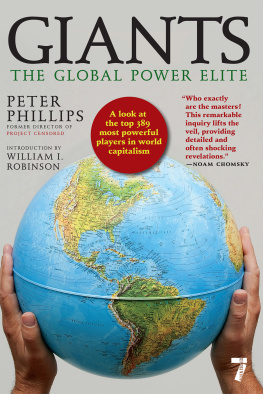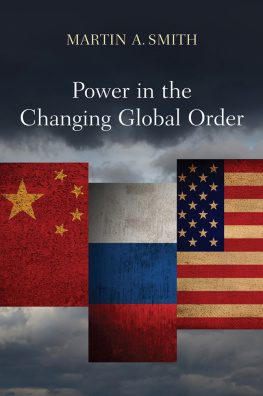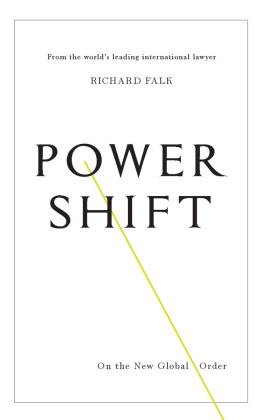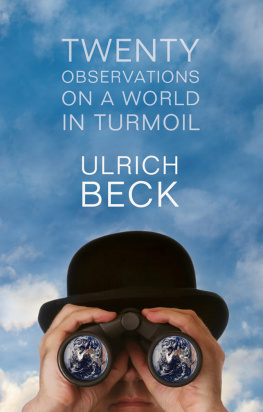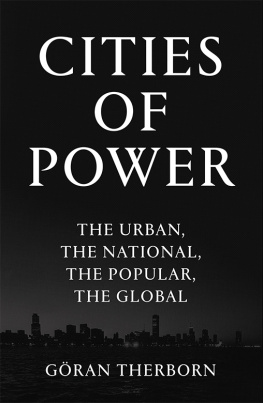
First published in German as Macht und Gegenmacht im globalen Zeitalter: Neue weltpolitische konomie Suhrkamp Verlag, Frankfurt am Main 2002
This translation first published in 2005 Polity Press
The right of Ulrich Beck to be identified as Author of this Work has been asserted in accordance with the UK Copyright, Designs and Patents Act 1988.
The publication of this work was supported by a grant from the Goethe-Institut.
Polity Press
65 Bridge Street
Cambridge CB2 1UR, UK
Polity Press
350 Main Street
Malden, MA 02148, USA
All rights reserved. Except for the quotation of short passages for the purpose of criticism and review, no part of this publication may be reproduced, stored in a retrieval system, or transmitted, in any form or by any means, electronic, mechanical, photocopying, recording or otherwise, without the prior permission of the publisher.
ISBN: 0-7456-3230-0
ISBN: 0-7456-3231-9 (pb)
ISBN: 978-0-7456-9453-5 (epub)
ISBN: 978-0-7456-9360-6 (mobi)
A catalogue record for this book is available from the British Library.
The publisher has used its best endeavours to ensure that the URLs for external websites referred to in this book are correct and active at the time of going to press. However, the publisher has no responsibility for the websites and can make no guarantee that a site will remain live or that the content is or will remain appropriate.
Every effort has been made to trace all copyright holders, but if any have been inadvertently overlooked the publisher will be pleased to include any necessary credits in any subsequent reprint or edition.
For further information on Polity, visit our website: www.polity.co.uk
List of Tables and Figures
Change in perspective and paradigm from a national to a cosmopolitan modernity and social science
Sociology of social inequalities viewed through the contrast between national and cosmopolitan perspectives
Paradigm change in the social sciences from the first modernity to the second modernity
On the distinction between the dimension of reality and the dimension of values
An unfettered world in transition: transformation of political conceptual forms and ways of looking at the world
Cosmopolitan realism: the structure of the cosmopolitan outlook, or politics in the world society
Global economic strategies of capital
State strategies
State typology for the second modernity
Political typology for the second modernity: pluralization of the left
Political typology for the second modernity: pluralization of the right
Varieties of critique and self-critique of New Critical Theory with cosmopolitan intent
Transformation of the legitimacy of global politics
The Hazy Power Space of Global Domestic Politics
Today, we Europeans act as if Germany, France, Italy, the Netherlands, Portugal, and so forth, still existed. Yet they have long since ceased to exist, because as soon as the euro was introduced if not before these isolated nation-state containers of power and the equally isolated, mutually excluding societies they represented entered the realm of the unreal. To the extent that Europe exists, there is no longer any such thing as Germany, or France, or Italy, or Britain, and so on, as these exist in people's heads and in the picture-book accounts of the historians. This is because the borders, responsibilities and exclusive experiential spaces on which this nation-state world was based no longer exist. But if all this is gone, if all we are doing is thinking, acting and researching in zombie categories, what comes along or has come along to take its place?
This is the question which this book raises and attempts to answer, developing a very wide-ranging and fundamental analysis of the social, economic and political transformations of the modern age. In this account the distinction that has underpinned our view of the world to date, namely that between national and international spheres, is being dissolved in what remains a somewhat hazy power space of global domestic politics. Nonetheless, it was this distinction that helped to shape the world of the first modernity, including its key concepts (and theories) of society, identity, state, sovereignty, legitimacy, violence and state authority. This book therefore asks: how might we conceptualize a world and a set of global dynamics in which the problematic consequences of radicalized modernization effectively eliminate the cornerstones and logics of action certain historically produced fundamental distinctions and basic institutions of its nation-state order? The answer that is developed and explicated in the following chapters goes as follows: the new global domestic politics that is already at work here and now, beyond the nationalinternational distinction, has become a meta-power game whose outcome is completely open-ended. It is a game in which boundaries, basic rules and basic distinctions are being renegotiated not only those between the national and international spheres, but also those between global business and the state, transnational civil society movements, supranational organizations and national governments and societies.
If those things that fall within the national framework are no longer national and those that fall within the international framework are no longer international, then the political realism of the national outlook is a false realism. Its place is taken instead so this book contends by a cosmopolitan realism, which needs to be fully explored conceptually in terms of its logics of power. Cosmopolitan realism focuses not only on the crucial role of global economic power and global business actors in relations of cooperation and competition among states, but also on the strategies of transnational civil society movements, including uncivil that is, terrorist networks which mobilize privatized violence against states for their own political purposes.
Cosmopolitan realism, or Machiavellianism, provides an answer to two questions in particular. First, what are the strategies by which global business actors impose their own rules of action upon states? And, second, how can states for their part win back political meta-power qua states in relation to global business actors, in order to impose a cosmopolitan regime on global political capital that encompasses political freedom, global justice, a secure social order and ecological sustainability? This New Global Political Economy acquires its relevance and explanatory power, on the one hand, from the fact that it is expounded as a theory of power about the strategic scope for action available in a transnational economy; on the other hand, it also takes up the counter-question suggested by this, namely, how can the world of state-organized politics (with its basic concepts, its strategic sphere of power, its institutional possibilities and constraints) be opened up to the challenges not only of the global economy but also of the global problems that are a consequence of modernization?
There are a number of signs pointing to the fact that a culture of glob-ality is advancing upon us and possibly even gaining in dominance among other things, the fact that, in the maelstrom of globalized modernization, global problems have long since become an everyday reality. Climate change, environmental destruction, food risks, global financial risks, migration, the anticipated consequences of innovations in genetics, human genetics, nanotechnology, and so forth, all serve to call into question in a quite tangible way the very foundations of social life. The nation-state has ceased to be the source of a frame of reference that encompasses all other frames of reference and enables political answers to be found. Moreover, the terrorist attacks of 11 September 2001 teach us that power does not translate into security. In this one radically divided world, it is likely that security will only be achieved once people's willingness and ability to see the world of unrestrained modernity through the eyes of the other, through the lens of difference, have been awakened at a cultural level and have become a part of our everyday existence. The task of creating a
Next page
